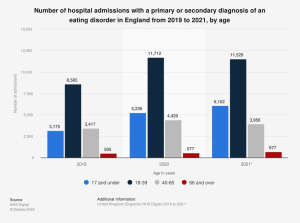Do you suffer from an eating disorder? Are you struggling to get through each day? Do you have a friend that is suffering from disordered eating? Beat eating disorders, such as binge eating, are possible.
Whether you do or not, this post will interest you. Taylor Swift has opened up about her eating disorder and how she overcame it. Her journey is inspirational and could show others the way to recovery.
“I thought that I was supposed to feel like I would pass out at the end of a show or in the middle of it.”
Taylor Swift
The popular 32-years-old American songwriter wrote an inspiring Instagram post admitting that “I thought I was supposed to feel like I would pass out at the end of a show or in the middle of it. And then I’d get offstage, and there would be people waiting for me, saying, “You were so great!” And I’d think, “Oh, good!” But inside, I was thinking: “What do they know? They don’t know what’s going on behind closed doors.”

(Wikipedia Contributors, 2022)
So this is something that many people who have eating disorders experience – an inability to recognise their symptoms because they’re so close to them. If you’re experiencing these things, it can help to seek professional help from someone who specialises in eating disorders, such as a GP or a therapist. It may also be worth speaking with loved ones if you’re worried about yourself or someone you care about. You can find more information about seeking help for an eating disorder here.
Taylor decided to take steps toward improving her health.
There are various ways to take better care of yourself and your health regarding eating disorders. You can start by talking with a doctor or therapist about your symptoms and getting an official diagnosis. Your doctor will likely have recommendations for treatment options based on the severity of your disorder and what type it is.
Therapy is an effective way to treat an eating disorder; many therapists use cognitive-behavioural therapy (CBT) as their primary approach to treating patients who have any mental illness, including eating disorders. CBT focuses on changing how we think about ourselves and our relationships with others through restructuring negative thought patterns into more positive ones so that we feel better about ourselves overall – this process helps us gain more control over our lives by reducing self-destructive behaviour patterns such as ruminating on past mistakes instead of going forward towards success!
She realised she wanted to help other people struggling with the same issues.
Taylor Swift realised that she had become a person other people could look up to and that she wanted to use her position as a role model for young people.
“I don’t want to be the person I was,” she said. “I don’t want to look back at life and think ‘my whole teenage years were about losing weight. It wasn’t about losing weight.”
She also emphasised the importance of self-acceptance and overcoming past mistakes when it comes to mental health issues, telling fans: “If you’re struggling with anything in your life, just know that even if one day you feel like giving up or quitting — which I sometimes do, too — just remember that if Taylor Swift can go through this thing and come out stronger… then anyone can.”

Taylor Swift started focusing on what makes her happy and not comparing herself to others.
It’s essential to focus on your own goals and not compare yourself to others. We often compare ourselves to other people, but this is the wrong way to think. It can make you feel bad about yourself, and it’s not healthy.
It would help if you focused on what you can do to improve yourself instead of worrying about how others are doing or comparing yourself to them. If you’re feeling down or anxious, try focusing on things that make you happy: spending time with friends, playing sports or being creative!
She said the only thing she could change was herself.
When Taylor realised that she needed help, she also realised that she could only change herself. She decided to take control of her life by improving her health and focusing on what made her happy. She chose not to compare herself to others or other celebrities in the industry because they were all different and had their struggles.
What are eating disorders
Eating disorders are a group of conditions marked by an unhealthy relationship with food and body weight. There are three main types of eating disorders which include anorexia nervosa, bulimia nervosa and binge eating disorder. Eating disorders are more common among women than men but can affect anyone regardless of age or gender.
Eating disorders have the highest mortality rate of any mental illness, and suicide is one of the leading causes of death in people who suffer from them.
According to the NHS (2022), it can affect any age but the 18-39 years old seem to be more affected. There is also a predominance of women among men.

How Psychotherapy can help with eating disorders
Psychotherapy can help people with eating disorders recognise and change negative thoughts and behaviours. Psychotherapy can help people with eating disorders identify and understand their feelings, thoughts and behaviours. Psychotherapy can also help people with eating disorders learn to manage stress more effectively by using techniques such as meditation or yoga.
Conclusion
Hopefully, her story will inspire you and help you realise that you’re not alone. Taylor’s story is just one of many. There are millions of people who struggle with their weight daily, and the idea of living a healthy lifestyle can seem nearly impossible. But it’s important to remember that you’re not alone, and there is hope for overcoming your condition, no matter what it is.
Eating disorders are serious mental illnesses that can require intense treatment for the sufferer to mentally and physically overcome them. Even after overcoming an eating disorder, it is common for a person to struggle with self-esteem issues, mood disorders, and anxiety, so it’s vital for those who have recovered from an eating disorder to seek additional help.
Therapethical is here for you, with you.
Sources:
NHS Digital. (2022). Several hospital admissions with a primary or secondary diagnosis of an eating disorder in England from 2019 to 2021, by age. Statista. Statista Inc.. Accessed: May 16, 2022. https://www.statista.com/statistics/671016/hospital-admissions-eating-disorders-united-kingdom-age/
